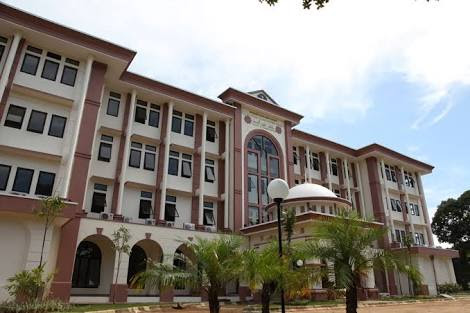THE EFFECTIVENESS OF IMPLEMENTING THE STEAM APPROACH BASED ON PROJECT-BASED LEARNING (PJBL) ON MIDDLE SCHOOL STUDENTS' SELF-CONFIDENCE AND CREATIVITY
EFEKTIVITAS PENERAPAN PENDEKATAN STEAM BERBASIS PROJECT BASED LEARNING (PJBL) TERHADAP KEPERCAYAAN DIRI DAN KREATIVITAS SISWA SMP
Abstract
This study aims to determine the self-confidence and creativity of Grade VIII students of SMP Negeri 33 Makassar and also to evaluate the effectiveness of implementing the STEAM approach based on Project Based Learning at SMP Negeri 33 Makassar. The research sample consisted of two classes which were then divided into a control class and an experimental class. The experimental class was given treatment in the form of applying the STEAM approach based on project-based Learning. The main instrument in this study was the researcher. The supporting instruments used were student response questionnaires, student self-confidence questionnaires, student activity observation sheets, and student creativity observation sheets. Then the data obtained is processed and interpreted. The results showed that: (1) The self-confidence of students who were taught using the STEAM approach based on Project Based Learning was better than those taught with conventional learning models. (2) the creativity of students taught with the STEAM approach based on Project Based Learning is better than those taught with conventional learning models. (3) The application of project-based Learning-based STEAM Approach is effectively applied in learning mathematics material in class VIII SMP Negeri 33 Makassar.
Downloads
References
Amalia, D., Sutarto, J., & Pranoto, Y. K. S. (2022). Pengaruh pembelajaran jarak jauh bermuatan STEAM terhadap karakter kreatif dan kemandirian. Jurnal Obsesi: Jurnal Pendidikan Anak Usia Dini, 6(3), 1233–1246. https://doi.org/10.31004/obsesi.v6i3.1765.
Andhianto, P. A., Fitriani, Y., & Nuroniah, P. (2024). Penerapan pembelajaran STEAM berbasis proyek penguatan profil pelajar pancasila (P5) di satuan PAUD. Murhum: Jurnal Pendidikan Anak Usia Dini, 5(1), 314–326. https://doi.org/10.37985/murhum.v5i1.547.
Arsy, I., & Syamsulrizal. (2021). Pengaruh pembelajaran STEAM (science, technology, arts, and mathematics) terhadap kreativitas peserta didik. Biolearning Journal, 8(1), 24–27. https://doi.org/10.36232/jurnalbiolearning.v8i1.1019.
Asdar, F., Arwadi, F., & Rismayanti. (2021). Pendekatan pendidikan matematika realistik terhadap hasil belajar matematika dan self-confidence siswa SMP. Plusminus Jurnal Pendidikan Matematika, 1(1), 1–16. https://doi.org/10.31980/plusminus.v1i1.857.
Budiyono, A., Husna, H., & Wildani, A. (2020). Pengaruh penerapan model pbl terintegrasi steam terhadap kemampuan berpikir kreatif ditinjau dari pemahaman konsep siswa. Jurnal Edusains, 12(2), 166–176.
Conradty, C., & Bogner, F. X. (2020). STEAM teaching professional development works: Effects on students’ creativity and motivation. Smart Learning Environments, 7(1), 26. https://doi.org/10.1186/s40561-020-00132-9.
Dywan, A. A., & Airlanda, G. S. (2020). Efektivitas model pembelajaran project-based learning berbasis STEM dan tidak berbasis STEM terhadap keterampilan berpikir kritis siswa. Jurnal Basicedu, 4(2), 344–354. https://doi.org/10.31004/basicedu.v4i2.353.
Haase, J., Hoff, E. V., Hanel, P. H., & Innes-Ker, A. (2018). A meta-analysis of the relation between creative self-efficacy and different creativity measurements. Creativity Research Journal, 30(1), 1–16. https://doi.org/10.1080/10400419.2018.1411436.
Kurniati, A., Muhandaz, R., & Hamzah, F. A. (2017). Pengaruh penerapan metode pembelajaran kelompok buzz terhadap kemampuan komunikasi matematika siswa. Suska Journal of Mathematics Education, 3(2), 111–118. https://doi.org/10.24014/sjme.v3i2.3525.
Kusumaningtyas, D. A., Jumadi, & Istiyono, E. (2020). Buku panduan mahasiswa untuk pembelajaran STEM ISCIT. Yogyakarta: PT Viva Victory Abadi.
Lestari, N. A., Eraku, S. S., & Rusiyah. (2021). Pengaruh pembelajaran project-based learning berintegrasikan science, technology, engineering, and mathematics (STEM) terhadap hasil belajar geografi di SMA Negeri 1 Gorontalo. Jambura Geo Education Journal, 2(2), 70–77. https://doi.org/10.34312/jgej.v2i2.11587.
Lin, C. L., & Tsai, C. Y. (2021). The effect of a pedagogical STEAM model on students’ project competence and learning motivation. Journal of Science Education and Technology, 30(1), 112–124. https://doi.org/10.1007/s10956-020-09885-x.
Maryam, M., Kusmiyati, K., Merta, I. W., & Artayasa, I. P. (2020). Pengaruh model pembelajaran inkuiri terhadap keterampilan berpikir kritis siswa. Jurnal Pijar MIPA, 15(3), 206–213. https://doi.org/10.29303/jpm.v15i3.1355.
Ministry of Education and Culture of Republik Indonesia. (2016). Peraturan menteri pendidikan dan kebudayaan republik indonesia nomor 22 tahun 2016 tentang standar proses pendidikan dasar dan menengah. Jakarta: Kemendikbud.
Ozkan, G., & Umdu Topsakal, U. (2021). Investigating the effectiveness of STEAM education on students’ conceptual understanding of force and energy topics. Research in Science & Technological Education, 39(4), 441–460. https://doi.org/10.1080/02635143.2020.1769586.
Pentang, J. (2023). Quantitative research instrumentation for educators. Wesleyan University.
Retnani, F. Y., Sukardjo, J. S., & Utomo, S. B. (2014). Penerapan metode numbered heads together (NHT) disertai Macromedia Flash untuk meningkatkan motivasi dan prestasi belajar siswa materi struktur atom, sistem periodik, dan ikatan kimia kelas XI IPA 4 SMA Negeri 2 Boyolali tahun pelajaran 2013/2014. Jurnal Pendidikan Kimia Universitas Sebelas Maret, 3(3), 57–65.
Smith, H. M. (2018). Exploring students’ internal motivation for engineering creativity: creative confidence and the arts. Queen’s University.
Subekti, Y., & Ariswan. (2016). Pembelajaran fisika dengan metode eksperimen untuk meningkatkan hasil belajar kognitif dan keterampilan proses sains. Jurnal Inovasi Pendidikan IPA, 2(2), 252–261. https://doi.org/10.21831/jipi.v2i2.6278.
Widana, W., & Septiari, K. L. (2021). Kemampuan berpikir kreatif dan hasil belajar matematika siswa menggunakan model pembelajaran project-based learning berbasis pendekatan STEM. Jurnal Elemen, 7(1), 209–220. https://doi.org/10.29408/jel.v7i1.3031.
Zubaidah, S. (2019). STEAM (science, technology, engineering, arts, and mathematics): Pembelajaran untuk memberdayakan keterampilan abad ke-21. In Seminar Nasional Matematika Dan Sains, September (pp. 1-18).
Copyright (c) 2024 Azizul Jabbar Mansyur, Afipa Amalia Bahar, Dadan Dasari

This work is licensed under a Creative Commons Attribution 4.0 International License.

